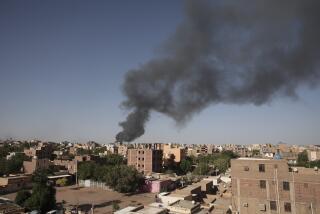U.S. May Toughen Travel Advisory, Cut Gulf Area Staffs : Mideast: It may urge more Americans to leave Saudi Arabia, Yemen and Jordan as U.N. deadline approaches.
- Share via
RIYADH, Saudi Arabia — U.S. officials are considering a stronger travel warning for Americans in Saudi Arabia and contemplating a reduction in embassy staffs throughout the Middle East in areas where there might be popular opposition to a military conflict with Iraq.
The British Embassy already has reiterated an earlier travel advisory for citizens in Saudi Arabia’s oil-rich Eastern province, advising British dependents to take holiday vacations in England and remain outside Saudi Arabia “until the situation in the (Persian) Gulf becomes clearer.”
Both moves come shortly after passage of a U.N. Security Council resolution giving Iraq a Jan. 15, 1991, deadline for pulling out of Kuwait, a move that officials here say has prompted a re-evaluation of whether the thousands of foreign workers in Saudi Arabia can safely remain at their jobs.
“This is obviously a new development that could lead to something, so you have to review your guidance,” said one source familiar with the reviews. “How can they make it a little bit stronger without causing unnecessary panic?”
Since mid-August, a U.S. travel advisory has advised families of American workers in the Eastern province, the center of the U.S. military buildup and the region closest to the Kuwait border, to leave the country. About 6,000 to 7,000 Americans have either left the province or failed to return from summer vacations outside the kingdom, officials said.
Now, U.S. officials are looking at the possibility of extending the recommendation for dependents to include non-essential employees in the Eastern province, or perhaps to make such departures mandatory. Another proposal under review would extend the travel advisory to all or part of the Central province, which includes the capital of Riyadh.
U.S. officials are also looking at reducing embassy staffs in Saudi Arabia and in countries elsewhere in the Middle East, such as Jordan and Yemen, where a conflict with Iraq might spark popular unrest. Some non-essential embassy personnel already have left the embassy in Yemen, and some embassy dependents in Jordan have left the country.
Travel advisories recommending departures for dependents in Bahrain, the United Arab Emirates and Qatar are also under review.
Embassy officials here refused to comment on the proposals. Spokesman John Kincannon said the State Department has made no decision on tightening travel restrictions or reducing embassy staffing levels. “We’re sort of assessing possibilities, discussing contingencies,” he said.
Rumors of an impending upgrade in the travel advisory have already sent some shock waves through the business community in Riyadh, where companies may face large costs for sending dependents home.
“We don’t mind evacuating them if it’s really not safe here. What we want to know is why they’ve told us all along it was safe to be here, and all of a sudden now it’s not safe?” one U.S. business manager asked.
In fact, most officials believe that Riyadh would likely not be severely threatened even in the event of a war with Iraq. However, the northern portion of the Central province, near the Iraqi border and the giant military base at Hafar al Batin, likely would be threatened, sources said.
Saudi officials have also expressed concern over any travel advisories that would prompt an exodus of foreign workers, who form the backbone of some of the kingdom’s most critical industries, including the oil industry.
“Saudi Arabia’s not quite like other countries. We all know about the large foreign presence here and the large number of basic services that are provided by foreigners, and that includes the military,” said one diplomat.
There are about 15,000 to 18,000 U.S. citizens in Saudi Arabia, about 13,000 of them in the Eastern province. About 23,000 British citizens are in the kingdom. Embassy officials said about 3,000 to 4,000 Britons have left Saudi Arabia since the Iraqi invasion of Kuwait.
More to Read
Sign up for Essential California
The most important California stories and recommendations in your inbox every morning.
You may occasionally receive promotional content from the Los Angeles Times.












